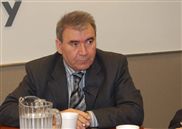
US-Azerbaijani Relations Cooling
Publication: Eurasia Daily Monitor Volume: 7 Issue: 6
By:

The end of 2009 saw a significant cooling of relations between the United States and Azerbaijan. Frustration in Baku with Washington’s policies, if not addressed, might significantly damage the bilateral relationship in the long run and undermine US strategic objectives in the energy-rich Caspian region.
Foremost, Azerbaijani political circles have been annoyed by Washington’s year-long insistence and active push for the opening of the Turkish-Armenian border without putting the liberation of the occupied Azerbaijani territories as a pre-condition. This, Azerbaijani officials believe, not only damages Azerbaijan’s national interests, but also weakens the peace process on Karabakh, by making Armenia less willing to compromise in negotiations. Open critique of Washington’s policies has come from officials in the Azerbaijani capital. Novruz Mammadov, the head of presidential administration’s foreign relations department, said at an international conference in Baku in November, “While the US provides strong moral and financial support to Armenia, which occupies Azerbaijani lands, we do not see significant assistance to Azerbaijan on the part of Washington.” Mammadov mentioned the intense pressure by the US on Azerbaijani officials in regards to the arrest of two bloggers in the summer of 2009. “We consider this as a tool of pressure on Azerbaijan,” stated Mammadov (Musavat, November 24).
Moreover, the appropriation by the US Congress of $8 million in humanitarian assistance to Karabakh provoked a major protest in Baku. Both official and non-governmental circles have expressed disagreement and disappointment with this policy on the part of Washington, claiming that it unjustly favors the Armenian community in Karabakh over the Azeris, helps to strengthen the illegal regime in the occupied lands and damages the reputation of the US as a neutral mediator.
Azerbaijan’s foreign ministry sent a note of protest to the US Government on December 18 (Trend News, December 18) and one member of parliament, Jamil Hasanli, called for the re-consideration of the strategic partnership with the US (www.day.az, December 24). Widespread condemnation of US foreign policy came from all sectors. The Vice-Speaker of the Parliament Ziyafat Asgarov said, “From the Azerbaijani side, we do not understand this step by the US, which calls us a strategic partner” (Kaspiy, December 12). A number of NGO’s have also sent their protest letters to the US Congress and a few opposition parties have staged protest rallies outside the US embassy in Baku (www.day.az, December 24).
Finally, the annual Freedom House report on the “Freedom of the Press 2009” denoted Karabakh as a joint Armenian-Azerbaijani territory, while rightly assigning South Ossetia and Abkhazia as Georgian territory. This was interpreted in Baku as an insult, considering the fact that the organization is funded by the US government. “Freedom House serves the interests of those who send $8 million to the separatists in Karabakh. This organization has long discredited itself,” said Elnur Aslanov, the head of department in the presidential administration (APA News Agency, December 14).
Perhaps, these events have been blown out of proportion in Azerbaijan, more so than in recent years. This also has to do with the strengthening of the Azerbaijani economy and as a result of its more strident political stance. Yet, the fact that Azerbaijan more frequently expresses frustration and annoyance with US policies shows that US-Azerbaijani relations are experiencing strategic rather than merely tactical coolness.
Indeed, the wars in Iraq and Afghanistan, economic crisis and loss of ideological attractiveness have made the US unpopular in many parts of the world, including the South Caucasus. The times when former Soviet republics were eager to align themselves with the US have remained rooted in early 1990’s. Strategic projects such as Baku-Tbilisi-Ceyhan pipeline, which have served to unite the interests of Azerbaijan and the US in the region, have also become part of history. The “reset” in US relations with Russia raises fears that it will come at the expense of the other newly independent states, thus bringing more distrust of Washington in Baku.
Meanwhile, a strengthened Azerbaijan, frustrated with the lack of progress on the resolution of the Karabakh conflict and dissatisfied with what is perceived as the short-sighted policies of President Barack Obama in regards to re-opening the Armenian-Turkish border, considers the US less as a strategic partner. There is an urgent need for US policy makers to pursue new large-scale projects, such as Nabucco, in order to boost its political standing in the region. High profile visits to the region are also of the utmost importance. But to begin with, bilateral relations would improve if the United States dispatched an ambassador to this critical Caspian state as the current post still remains vacant. Otherwise, the US might soon witness a further decline in its political standing in the region.




